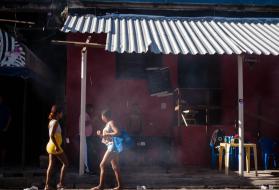Projects
|
Launched November 25, 2013
David Rohde, prize winning reporter and Pulitzer Center board member, covers foreign affairs extensively in his books and as a Reuters columnist.
Follow his reporting, commentary, and public events.
|
Launched November 25, 2013
"Honduras: Aqui Vivimos" ("Honduras: We Live Here") explores the social conditions—abject poverty, corruption, political disillusionment, and gang culture—that have made Honduras a violent country.
|
Launched November 22, 2013
Many experts thought Assad would be out of power by now. But the initial popular uprising has devolved into religious and ethnic strife. Assad is seen by some as the best hope for stability.
|
|
Launched November 17, 2013
A special election in Nepal fuels hope for an end to years of gridlock but thousands of Nepalis are voting with their feet—leaving the country in pursuit of better opportunities.
|
Launched November 17, 2013
It has been 15 years since the end of Northern Ireland's Troubles yet in Belfast, a city carved by "Peace Walls," the tension is still palpable.
|
Launched November 14, 2013
Prostitution is not illegal in Brazil. Yet a campaign to “clean-up” the country’s image ahead of the World Cup is rendering those working in Brazil’s sex industry increasingly vulnerable.
|
|
Launched November 11, 2013
Four decades after the military overthrew Chile’s democratically-elected government, the past remains a vital force in the country. A look at elections, memory and reform in this wounded nation.
|
Launched November 6, 2013
Monotowns, Russian cities dependent on dying industries, face an even more uncertain future now that Russia has joined the World Trade Organization.
|
Launched October 31, 2013
How can you provide power for a country of 200 million people? This series examines Brazil's energy needs as one of the biggest economic players.
|
|
Launched October 30, 2013
UN enforcement of "responsibility to protect" has too often focused more on protecting UN troops than civilian populations. In eastern Congo UN military leaders are talking—and taking—a tougher line.
|
Launched October 25, 2013
Children in the DRC who have lost families, homes and schools prove to be resilient as well as vulnerable. Arts, sports and vocational training help them to re-connect and start life anew.
|
Launched October 25, 2013
Non-communicable diseases cause 63 percent of deaths worldwide. In India, diabetes, heart attacks and cancer are on the rise across all strata of society.
|
|
Launched October 16, 2013
A brutal and illegal practice takes place far off the coast of Peru--the secret slaughter of thousands of dolphins for use as bait in the lucrative long-line shark fisheries.
|
Launched October 14, 2013
The tensions between India's patriarchal traditions and modernism can be seen in the struggle against dowry violence.
|
Launched October 8, 2013
Roiling tensions underlie efforts to improve food security in Africa, often pulling at cross purposes on farmers, consumers and their countries.
|
|
Launched October 1, 2013
While Nepal’s hydropower potential is great, economic, health and environmental impacts from dams are emerging. Steve Matzker and Jennifer Gonzalez explore water rights issues in the region.
|
Launched September 26, 2013
When protests flooded Turkey, they revealed deep problems. Police brutality, authoritarianism, and a fractured opposition moved from the margin to the spotlight. Today, what remains hidden?
|
Launched September 26, 2013
Several African countries are preemptively treating children for malaria after trials found the measure drastically lowers deaths. Will on-the-ground results be as promising?
|
|
Launched September 25, 2013
In the megalopolis of Lagos, Nigeria, abortion is legally restricted and contraception is hard to come by. What are the consequences for this city's exploding youth population?
|
Launched September 19, 2013
In the face of Israeli control of West Bank water sources, land expropriation, and settler violence, Palestinian farmers must deploy innovative methods to sustain their lands – or lose them.
|
Launched September 13, 2013
In 2009, The Seattle Times reported that ocean acidification – the plummeting pH of seas from carbon-dioxide emissions – was killing billions of Northwest oysters. That was only the beginning.
|
|
Launched September 12, 2013
What will happen to the progress that’s been made in education and women’s rights in Afghanistan? It’s a legacy NGOs have spent millions building. And many Afghans worry it's what is most at risk.
|
Launched September 10, 2013
From the streets of Phnom Penh to the rice fields of Cambodia, Melisa Goss explores what lies behind the sex trade and what is being done to prevent it, stop it, and restore those caught in its trap.
|
Launched September 10, 2013
Despairing of the ability of their squabbling leaders and militiamen to reestablish the state, Libyans are busy reviving the country on their own.
|























